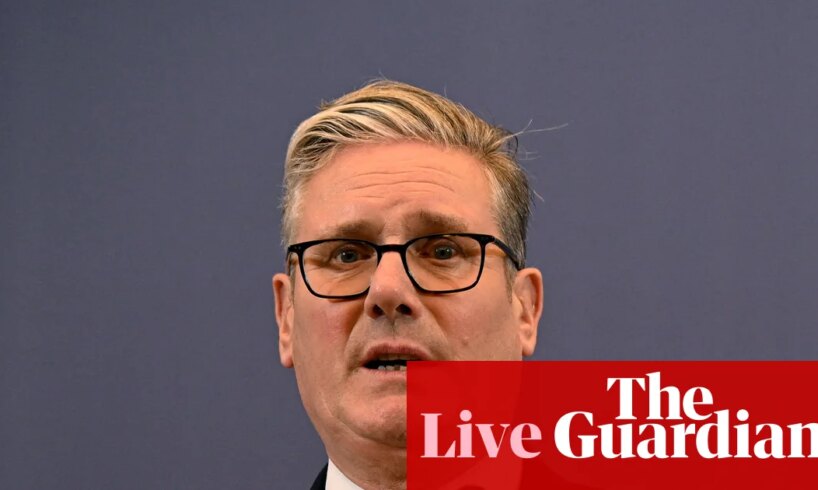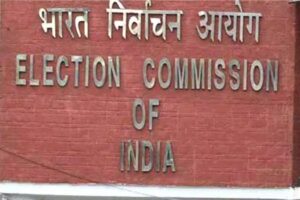
Starmer to face MPs amid continued pressure over collapse of China spying trial
Good morning. As Kiran Stacey reports, the government has today announced new plans to relax planning rules that hold up the construction of new infrastracture. It already has a bill going through parliament designed to do this, the planning and infrastructure bill, but, with the legislation close to reaching the point where it clears both houses and becomes law, the government has produced a raft of amendments that will make it stronger.
That is why Steve Reed, the housing secretary, has been doing a media round this morning. But, inevitably, most of the questions have focused on China.
Yesterday, in a private notice question in the Lords and a ministerial statement in the Commons, the government tried to kill off claims that it deliberately sabotaged the prosecution of two men who were due to go on trial for allegedly spying for China. As Dan Sabbagh explains, the various ministers and officials commenting yesterday failed to adequately explain why the trial was not able to go ahead.
Keir Starmer is expected to address the Commons today, but his statement is due to cover the Middle East peace process and his trip to India, and so MPs may find it hard to shoehorn in questions about China.
But, in his media round, Reed couldn’t avoid questions on the ground they were off topic. He restated the government’s assertion that the decision to drop the prosecution was taken by the Crown Prosecution Service, not by ministers, because the law in place at the time the alleged offences was committed was too restrictive to allow a successful prosecution to proceed.
As housing secretary, Reed will have the final say over whether to approve the application from China to build a new “super-embassy” in the centre of London. A decision is due later this month. There has been a hold-up because China refused to supply unredacted plans for the building (the original plans did not specify what certain rooms in the embassy would be used for), and Reed said he would not approve the application without seeing full plans.
I expect to see everything that is being proposed before I take a decision.
More significantly, he also insisted that national security would be “paramount” in the decision process.
Speaking to Times Radio, asked if the security risk posed by China would be a factor in the decision, Reed replied:
Speaking in general terms, because I can’t comment on that particular application, then, yes, this government recognises that China poses a threat to national security and we see that from various cyber attacks and cyber incidents that have happened. That’s one of the reasons why the government has increased spending on security and defence by £600m.
Asked if the government was prepared to put the economic benefits of a relationship with China ahead of security concerns, Reed said:
For this government, as in for any sensible government of the United Kingdom, national security is paramount, and will always be paramount. The decision will be taken on the merits of the case in front of me. We would never compromise national security.
Reed was speaking as the opposition parties continued to pile on pressure over this issue.
For the Conservatives, Chris Philp, the shadow home secretary, wrote to the CPS asking for confirmation that, if the government does provide new evidence saying China is a threat to national security, the prosecutions can be resumed, and the trial can go ahead.
And, for the Liberal Democrats, Calum Miller, the party’s foreign affairs spokesperson, is demanding that the government publish all relevant correspondence between the government and the CPS. Referring to hints the government is blaming Matthew Collins, the deputy national security adviser, Miller said: “The government’s attempts to duck scrutiny and scapegoat a single official simply won’t wash.”
Here is the agenda for the day.
Morning: Keir Starmer chairs cabinet.
10am: Nigel Farage, the Reform UK leader, is due to speak to the media at Southwark crown court after the sentencing of Fayaz Khan, the Afghan who arrived in the UK on a small boat and who has been found guilty of threatening to kill him.
10am: Gavin Williamson, the Tory former education secretary, gives evidence to the Covid inquiry as part of its module looking at how the pandemic affected children and young people.
11.30am: Ed Miliband, the energy secretary, takes questions in the Commons.
After 12.30pm: Starmer is expected to make a statement to MPs about the Middle East peace summit and his trip to India.
2pm: The IMF publishes its latest world economic outlook report, including its latest forecasts for the UK.
3.45pm: Miliband speaks at the Energy UK conference.
If you want to contact me, please post a message below the line when comments are open (normally between 10am and 3pm BST at the moment), or message me on social media. I can’t read all the messages BTL, but if you put “Andrew” in a message aimed at me, I am more likely to see it because I search for posts containing that word.
If you want to flag something up urgently, it is best to use social media. You can reach me on Bluesky at @andrewsparrowgdn.bsky.social. The Guardian has given up posting from its official accounts on X, but individual Guardian journalists are there, I still have my account, and if you message me there at @AndrewSparrow, I will see it and respond if necessary.
I find it very helpful when readers point out mistakes, even minor typos. No error is too small to correct. And I find your questions very interesting too. I can’t promise to reply to them all, but I will try to reply to as many as I can, either BTL or sometimes in the blog.
Share
Updated at 10.34 CEST
Key events
Show key events only
Please turn on JavaScript to use this feature
Cyber security chiefs describe China as ‘threat actor’, but sidestep questions about wider risk and collapsed spy trial
Dan Sabbagh
Dan Sabbagh is the Guardian’s defence and security editor.
China “continues to be a highly sophisticated and capable threat actor, targeting a wide range of sectors and institutions across the globe, including the UK,” the UK’s National Cyber Security Centre warned in its annual review published overnight.
However, in a press conference this morning, NCSC chiefs declined to go further and describe Beijing as “a current threat to national security” – the phrase sought unsuccessfully by the Crown Prosecution Service, so leading to the collapse of the trial of two men accused of spying for China.
Though Richard Horne, the chief executive of NCSC, which is part of GCHQ, acknowledged that when it comes to the cyber threat from China “the volume is rising” as it is in “all different categories of incident”, he would not be drawn any further when asked explicitly about the overall threat level from Beijing.
Using carefully chosen language Horne responded:
We have to be clear on the cyber threat that we see, and how that’s categorised in a larger threat picture is not for us to say.
Dan Jarvis, the security minister, was also at the same event, but after making a short speech that did not refer to China or any other country left without taking questions. Last night Jarvis told MPs that “every effort” had been made to support the now failed prosecution.
Share
Human rights official urges UK to review laws after Palestine Action placard arrests
Europe’s most senior human rights official has called on Shabana Mahmood to review UK protest laws after mass arrests over the ban on Palestine Action, Rajeev Syal reports.
Share
The Commons authorities have confirmed that there will be two statements in the chamber after 12.30pm: first, Keir Starmer on the Middle East peace summit, and then Hilary Benn, the Northern Ireland secretary, on the Northern Ireland Troubles bill being published today.
Share
Steve Reed says he was ‘horrified’ by women being excluded from Muslim charity run in London park
Steve Reed, the communities secretary, has said he was “horrified” and “appalled” by a Muslim charity run in a London park which excluded women from participating, PA Media reports. PA says:
East London Mosque, which organised Sunday’s run in Victoria Park alongside the London Muslim Centre, said hundreds of runners and supporters had gathered for the community event.
Billed on the Muslim Charity Run website as an “inclusive 5km race” welcoming “runners and supporters of all ages and abilities”, the event was open to “men, boys of all ages and girls under 12”.
Reed described it as “absolutely unacceptable” for women to be “blocked” from participating and said the Equality and Human Rights Commission (EHRC) will determine whether any laws or regulations have been breached.
Reed told LBC Radio: “I saw these reports … and I was as horrified as anybody else. It’s absolutely unacceptable that women should be blocked from going on a fun run in a public space when the men are allowed to go out there and do that. Now we have an equalities watchdog, I’m sure that they will be aware of this case.”
“It’s getting a lot of publicity, and quite rightly so, and they will determine whether there has been any breach of the law or regulations and then I’m sure sanctions will follow as appropriate.
“But speaking for myself, I was appalled.”
He added: “We do not want a situation in this country where men are allowed to do things that women are then barred from. We cannot tolerate that.”
The annual event is described on the mosque website as having become a “highlight in the East London Muslim calendar, raising thousands of pounds for vital causes across the UK and abroad, from local youth projects, food banks and refugee support to international humanitarian relief”.
The mayor of Tower Hamlets, Lutfur Rahman, has defended the event and congratulated those who took part.
A spokesperson for the EHRC said: “The EHRC receives complaints each week about allegations of unlawful activity contrary to the Equality Act 2010. We consider each complaint carefully and take action where appropriate.”
Certain exceptions under equality law can apply to charities and religion or belief organisations, including potentially restricting events to one sex only.
A Tower Hamlets council spokesperson said: “This was an independent event held in Victoria Park, not organised by the council. Like many local charitable events, it made use of the park space. Following the reports about age and gender restrictions, the council has contacted East London Mosque to seek urgent clarification.
East London Mosque and London Muslim Centre have been contacted for comment.
Share
76% of Labour members would back breaking manifesto promise on tax to raise cash for public services, poll suggests
It is widely expected Rachel Reeves, the chancellor, will have to raise taxes by around £30bn in next month’s budget and there is a debate about how this should be done. Economists generally think the simplest and cleanest way to do this would be raise one of the big three taxes that, together, account for most of government revenue – income tax, national insurance or VAT. But in its manifesto Labour ruled out all three of these options, and instead Reeves is considering bundling up a series of smaller tax rises that could together get her to £30bn, or whatever the total is. But there is a risk she would end up with a string of “pasty tax” measures – unpopular moves with a political cost out of all proportion to the revenue at stake.
Reeves is said to be strongly opposed to breaking the manifesto pledges. But at Labour conference there were hints that this had not been 100% ruled out – in particular, in the weird decision by Starmer, and other ministers, to just say the manifesto “stands” when asked if the pledges still applies. At one point Darren Jones, the Cabinet Office minister and chief secretary to the PM, seemed to give the game way when he said: “The manifesto stands today because decisions haven’t been taken yet.”
If Reeves were to break a manifesto promise on tax, Labour party members would support her, new polling suggests. Survation regularly polls Labour members for the LabourList website and its latest survey suggests three quarters of members would back breaking a pledge to find more money for public services. In his report for LabourList, Daniel Green says:
In an exclusive poll of Labour members, conducted by Survation, 76% said they would back a rise in national insurance, income tax or VAT in order to put more money into public services, with 20% opposed.
While 79% of those who backed Keir Starmer in the 2020 leadership contest would support the government breaking its promise not to raise those three taxes, support was weaker among those who backed Rebecca Long-Bailey at 69%.
The views of Labour members probably won’t count for much when Reeves is finalising the budget. But there are other arguments in favour of tearing up a manifesto pledge that Stephen Bush summed up in a good column on this debate the Financial Times yesterday.
Labour’s problem is again, pretty simple. When it was in opposition, it didn’t plan enough for government. The party made a series of foolish promises on tax rises that make it hard, perhaps impossible, to satisfy its pledges on public services and growth.
So it faces a choice: which promises should it break? Its implicit promise that public services will get better, or its explicit promise not to increase income tax, value added tax or national insurance rates. Robert Shrimsley made the argument recently that it is the implicit promise that has to go: “Governments should keep explicit promises … Tearing up such a central promise would not just hurt Labour. It would be utterly corrosive to democracy, cementing the view that all parties lie” …
I don’t disagree with any of this, but where I part ways with Robert is I think the “all parties lie” ship has not just sailed — it has reached the new world, declared its independence from the mother country and established the world’s pre-eminent superpower …
A big part of why the UK is where it is right now is that in 2019 and 2024, the winning party ran on a “public services will get better — the big taxes will stay at the same level” ticket that just could not be reconciled with reality.
Share
Updated at 11.54 CEST
Parenting advice on social media is often poor quality, says Phillipson
Parents who turn to TikTok influencers and Instagram gurus for advice on everything from potty training to childhood vaccination are at risk of falling victim to misleading and poor quality information, Bridget Phillipson, the education secretary, has warned. Sally Weale has the story.
Share
In the Commons yesterday Kemi Badenoch quoted Mark Elliott, a public law professor at the University of Cambridge, as one of the many experts who have queried the government’s account of why the China spy prosecution failed. On the basis of what was said in the Commons yesterday, Elliott has now written a new blog, highlighting what he says are ongoing inconsistencies in the government’s story and setting out possible theories as to what went wrong. The blog is worth reading in full, but here is his conclusion.
We can, then, add a fifth possible explanation to the four set out above: that ministers prevailed over decision-making arrangements concerning highly consequential national security-related matters that afforded individual officials a wholly inappropriate degree of unilateral discretion, and that ministers failed to put in place a framework for ensuring that such decisions were appropriately stress-tested before being finalised. Like the first four possible explanations outlined earlier in this post, I do not claim that the fifth explanation necessarily describes what actually happened — but it is arguably the most likely.
The overwhelming message conveyed by the security minister [Dan Jarvis – the minister making a statement in the Commons yesterday] was that this is matter for which ministers bear no responsibility because it was handled wholly at official level. But that will not wash. Whatever uncertainties there might be about the nuances of the constitutional doctrine of ministerial responsibility, if ministers are responsible for anything, they must be responsible for ensuring that the way in which national security-related decisions are made is fit for purpose. If, then, it turns out that this is a story of official failure, it is also necessarily, and more importantly, a story of ministerial failure.
In their London Playbook briefing for Politico this morning, Dan Bloom and Andrew McDonald quote an unnamed “foreign policy operator” making a similarish point. He or she says:
This government keeps trying to make apolitical decisions about a policy that is deeply political, and in turn essentially makes political choices but doesn’t take ownership of them.
Share
UK labour market shows signs of stabilising after job losses
Britain’s employment market has shown signs of stabilising after a sharp rise in job losses earlier this year blamed on tax rises introduced by Rachel Reeves, Richard Partington reports. As the chancellor prepares for her 26 November budget, figures from the Office for National Statistics showed the unemployment rate rose to 4.8% in the three months to August, up from 4.7% in July.
Share
Green party reachest highest ever level in YouGov poll, at 13%
YouGov has released its latest weekly poll in the series it does for the Times. Reform UK (27%), Labour (20%) and the Conservatives (17%) all have exactly the same level of support as they did last week. But the Greens have hit their highest level ever in a YouGov poll, at 13%.
YouGov poll Photograph: YouGovShareYvette Cooper, the foreign secretary, and John Healey, the defence secretary, arriving for cabinet this morning. Photograph: Leon Neal/Getty ImagesShare
Starmer to face MPs amid continued pressure over collapse of China spying trial
Good morning. As Kiran Stacey reports, the government has today announced new plans to relax planning rules that hold up the construction of new infrastracture. It already has a bill going through parliament designed to do this, the planning and infrastructure bill, but, with the legislation close to reaching the point where it clears both houses and becomes law, the government has produced a raft of amendments that will make it stronger.
That is why Steve Reed, the housing secretary, has been doing a media round this morning. But, inevitably, most of the questions have focused on China.
Yesterday, in a private notice question in the Lords and a ministerial statement in the Commons, the government tried to kill off claims that it deliberately sabotaged the prosecution of two men who were due to go on trial for allegedly spying for China. As Dan Sabbagh explains, the various ministers and officials commenting yesterday failed to adequately explain why the trial was not able to go ahead.
Keir Starmer is expected to address the Commons today, but his statement is due to cover the Middle East peace process and his trip to India, and so MPs may find it hard to shoehorn in questions about China.
But, in his media round, Reed couldn’t avoid questions on the ground they were off topic. He restated the government’s assertion that the decision to drop the prosecution was taken by the Crown Prosecution Service, not by ministers, because the law in place at the time the alleged offences was committed was too restrictive to allow a successful prosecution to proceed.
As housing secretary, Reed will have the final say over whether to approve the application from China to build a new “super-embassy” in the centre of London. A decision is due later this month. There has been a hold-up because China refused to supply unredacted plans for the building (the original plans did not specify what certain rooms in the embassy would be used for), and Reed said he would not approve the application without seeing full plans.
I expect to see everything that is being proposed before I take a decision.
More significantly, he also insisted that national security would be “paramount” in the decision process.
Speaking to Times Radio, asked if the security risk posed by China would be a factor in the decision, Reed replied:
Speaking in general terms, because I can’t comment on that particular application, then, yes, this government recognises that China poses a threat to national security and we see that from various cyber attacks and cyber incidents that have happened. That’s one of the reasons why the government has increased spending on security and defence by £600m.
Asked if the government was prepared to put the economic benefits of a relationship with China ahead of security concerns, Reed said:
For this government, as in for any sensible government of the United Kingdom, national security is paramount, and will always be paramount. The decision will be taken on the merits of the case in front of me. We would never compromise national security.
Reed was speaking as the opposition parties continued to pile on pressure over this issue.
For the Conservatives, Chris Philp, the shadow home secretary, wrote to the CPS asking for confirmation that, if the government does provide new evidence saying China is a threat to national security, the prosecutions can be resumed, and the trial can go ahead.
And, for the Liberal Democrats, Calum Miller, the party’s foreign affairs spokesperson, is demanding that the government publish all relevant correspondence between the government and the CPS. Referring to hints the government is blaming Matthew Collins, the deputy national security adviser, Miller said: “The government’s attempts to duck scrutiny and scapegoat a single official simply won’t wash.”
Here is the agenda for the day.
Morning: Keir Starmer chairs cabinet.
10am: Nigel Farage, the Reform UK leader, is due to speak to the media at Southwark crown court after the sentencing of Fayaz Khan, the Afghan who arrived in the UK on a small boat and who has been found guilty of threatening to kill him.
10am: Gavin Williamson, the Tory former education secretary, gives evidence to the Covid inquiry as part of its module looking at how the pandemic affected children and young people.
11.30am: Ed Miliband, the energy secretary, takes questions in the Commons.
After 12.30pm: Starmer is expected to make a statement to MPs about the Middle East peace summit and his trip to India.
2pm: The IMF publishes its latest world economic outlook report, including its latest forecasts for the UK.
3.45pm: Miliband speaks at the Energy UK conference.
If you want to contact me, please post a message below the line when comments are open (normally between 10am and 3pm BST at the moment), or message me on social media. I can’t read all the messages BTL, but if you put “Andrew” in a message aimed at me, I am more likely to see it because I search for posts containing that word.
If you want to flag something up urgently, it is best to use social media. You can reach me on Bluesky at @andrewsparrowgdn.bsky.social. The Guardian has given up posting from its official accounts on X, but individual Guardian journalists are there, I still have my account, and if you message me there at @AndrewSparrow, I will see it and respond if necessary.
I find it very helpful when readers point out mistakes, even minor typos. No error is too small to correct. And I find your questions very interesting too. I can’t promise to reply to them all, but I will try to reply to as many as I can, either BTL or sometimes in the blog.
Share
Updated at 10.34 CEST





